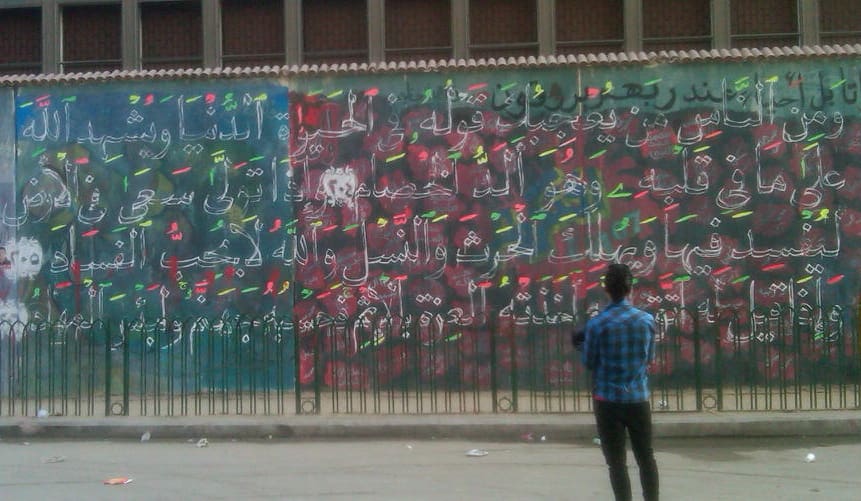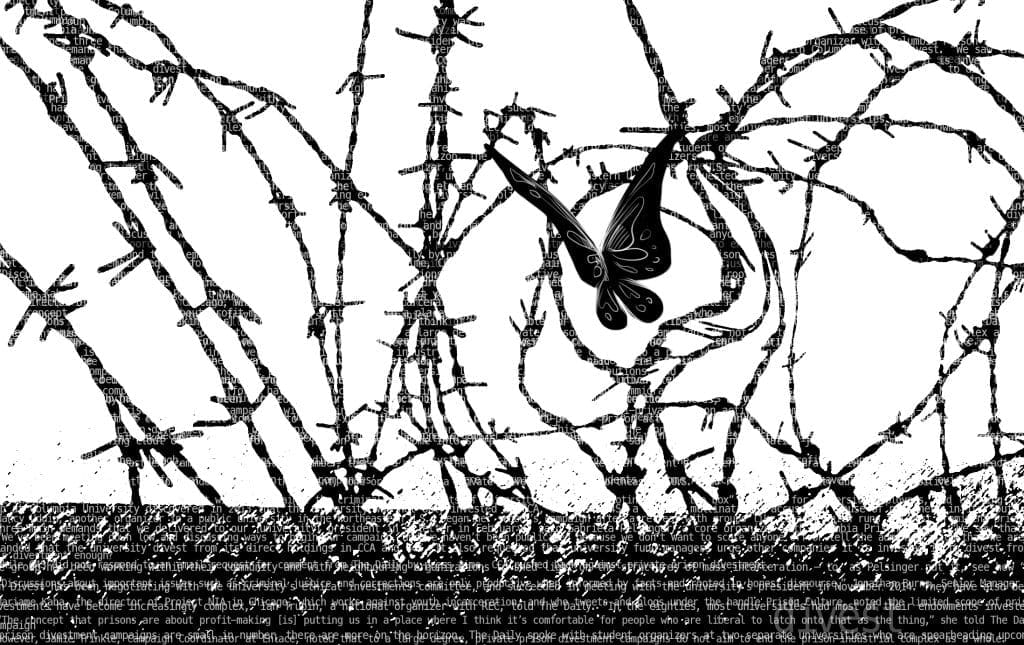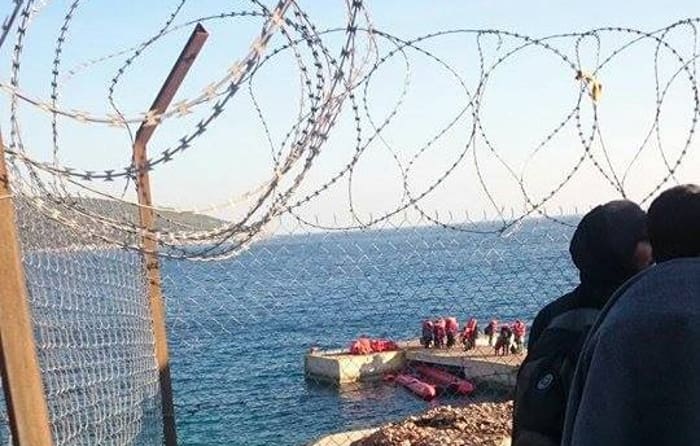Transcribed from the 6 August 2016 episode of This is Hell! Radio (Chicago) and printed with permission. Edited for space and readability. Listen to the whole interview:
Egypt went through a process of political transition, starting in 2011, that failed. This had a demoralizing impact especially on the people who were most enthusiastic, who had ambitions for the whole country to witness some kind of democratic transformation. Now, the general population in Egypt has really lost faith in politics.
Chuck Mertz: The Egyptian government is facing one economic crisis after another, and whatever president el-Sisi does will likely lead to protests—protests that are currently illegal in Egypt. And however Sisi responds to those protests will likely lead to more protests, and who knows how far that will go.
Here to explain why Egypt is between a rock and a hard place: Amr Adly is a non-resident scholar at the Carnegie Middle East Center, where his research centers on political economy, development studies, and economic sociology of the Middle East, with a focus on Egypt. He recently wrote the article Egypt’s Regime Faces an Authoritarian Catch-22, which was posted at the Carnegie Endowment for International Peace website.
Welcome to This is Hell!, Amr.
Amr Adly: Hi!
CM: Great to have you on the show.
You start with a pretty grim assessment of Egypt, writing that “The regime of Egyptian president Abdel Fattah el-Sisi is stuck between a rock and a hard place. The country’s current economic crisis deprives the regime of the financial and economic resources needed to sustain a solid social base among public sector employees, and hence hinders the consolidation of authoritarian rule. But at the same time, the regime’s reliance on the government gives it little latitude to pursue economic reforms. The regime may survive, but at the high price of continued repression, and an inability to alleviate worsening socioeconomic conditions.”
So if a bad economy is keeping Sisi from authoritarian rule, is a bad economy good for the people of Egypt? Is that good for civil society because it undermines the authoritarian rule of their leader?
AA: We have to be aware of the broader context in Egypt. Following the 2011 uprising that managed to topple Mubarak, Egypt started a transition towards what was hoped to be a non-authoritarian form of rule. But the whole process ended up collapsing because of elite infighting and an inability to reach the bare minimum of consensus, which again led to massive demonstrations in mid-2013 that basically invited the military to take power again. By mid-2013 we had a military-backed regime, and in mid-2014 Sisi, who was the prime minister when the military takeover took place, became president.
In this broader context there was a general process of depoliticization, that had started even before the military coup. People were quite disenchanted with politics: they thought that it was too divisive; it led to an economic slowdown. And the general situation was definitely quite bad. What was hoped for, of course, was that a stabilization of the situation in the country—which happened at extremely high cost in terms of human rights violations and repression—would lead to the regeneration of economic growth and economic recovery after four years of slowdown.
But this is not happening, for many reasons. Some of them are local; they have to do with policies and choices that were made by Sisi and his regime. Others have to do with the global economic slump and the plunge in oil prices which hampered the capacity of Persian Gulf countries to extend credit and aid to Egypt.
All in all, this very grim economic situation is putting tremendous pressure on the general population in Egypt, but at the same time it is impeding the regime’s capacity to consolidate authoritarianism.
CM: You write, “Egypt’s economy is highly dependent on external factors, above all the health of the regional and global economic orders that face great uncertainty in 2016…Prospects for an economic recovery have been hindered by a worsening shortage of foreign currency. Fees from the Suez Canal stagnated in the wake of the Chinese economic slowdown, with trade between China, Europe, and the United States constituting a major portion of maritime traffic through the canal.” You also point to problems with tourism.
So are Egypt’s economic problems driven primarily by external factors, factors out of the Sisi government’s control? Can we blame el-Sisi for Egypt’s economic crises, if they have to do with the global price of oil, the downing of a Russian airliner, or China’s economic slowdown? After all, those aren’t Sisi’s fault, correct?
AA: The downing of the Russian aircraft in October 2015 is definitely the responsibility of the Egyptian state. This was a clear security failure that cost the country a lot in a very dark time. Because the tourism sector—which had already been negatively impacted by the general turmoil in the region since 2011—was completely killed in the last portion of 2015, and hasn’t recovered to this day. The revenues, which were already quite weakened, almost completely stopped. This, of course, exacerbated the crisis-level shortage of foreign currency.
But then there are many factors, as you were just saying, that go beyond Sisi’s capacity to relaunch the economy or regenerate economic growth. However, the question here is not really about economic recovery in the sense of getting back to a higher growth rate. It has to do with decisions that were made under Sisi about how to manage the crisis.
There is an economic crisis; it has global dimensions, I grant you. But the question is how to manage it with the least social and economic damage. The way things have been managed were not very helpful. There were, for instance, decisions that were made to start megaprojects, what are called national projects. And many of these—like the second Suez canal that was dug, consumed the equivalent of eight billion US dollars in construction. The issue is that the total revenue generated by the Suez canal has been stagnating because of contractions in global trade. This is an exemplary case in which economic decisions which consume a lot of badly needed resources are made out of political calculations, are usually quite myopic, and are very misinformed.
We are not sure yet whether this project or the many other national projects that consume lots of the limited resources of the country were based on any feasibility studies, because none of this is actually subject to public debate. Of course, the public sphere that was once tolerated under Mubarak, and that expanded considerably after his toppling in 2011, is now virtually nonexistent, given all the measures to censor the media and to limit protests. Public debate is almost nonexistent in Egypt. Many of these decisions are not being debated, not even among experts. And these are decisions that have distributional consequences and are political in nature, so they have to be debated.
CM: What explains the relative amount of stability that we’ve seen over the last three years despite no rebound in the economy?
AA: There are a couple of factors that may explain the relative stability Egypt has been witnessing. First of all, of course, there is a very high level of repression that did not exist before, at least not since the 1990s. This is definitely a factor. Most of the activists or opposition groups who could have mobilized opposition are no longer active. The margins for voicing dissent are very limited, if they exist at all.
However, we have to bear in mind as well that Egypt went through a process of political transition, starting in 2011, that failed. And it did not fail because of the military takeover, actually; the military takeover was the result of this failure. This had a demoralizing impact on especially on the people who were most enthusiastic, who had ambitions for the whole country to witness some kind of democratic transformation. Now, the general population in Egypt (that is, the bulk of the middle and lower-middle classes in Egypt, who are crucial to politics both in the street and electorally) has really lost faith in politics.
And if we take a look around the region, at the Middle East and North Africa, things are very scary: the melting down of entire nation-states, where central government ceased to exist, like in Libya; very high-intensity civil conflict, like in Syria or in Iraq, not to mention Yemen. These are nearby elements that inspire fear instead of hope. This is the reason that people in Egypt will tolerate, for the time being, at any cost, economic as well as political, the existence of a government that can supply the bare minimum of public order.
To construct what a revolution was really about is something that needs lots of research, and I don’t think that the history of the Egyptian revolution has been written, or is likely to be written even in the coming few years.
CM: You write about the Egyptian polarization in 2012 and 2013, when Mohammed Morsi was president: “This period was characterized by heightened tensions resulting from the inability of civilian elites, Islamist and secular, to reach a consensus on the foundations of a post-revolutionary order and the relationship between state and religion. The discord was exacerbated by the passage of a controversial constitution in 2012 backed by the then-president. The ensuing instability led to the buildup in opposition to Morsi and his removal from power by the military.”
Opponents of that controversial constitution at the time called it an “Islamist coup.” Is that an accurate statement? And are conditions on the ground today a result of that so-called Islamist coup? In other words, would Egypt be where it is today without the controversial constitution that Morsi supported?
AA: Most of the literature on successful cases of democratization inform us that we need to reach some kind of basic consensus among the population and among the representatives of the political mainstream on what the post-authoritarian order should look like. And in Egypt, as well as in the majority of Arab countries, how religion is to be related to political authority has always been a very controversial issue.
In Egypt, the Brotherhood, who won most of the elections that were held following the toppling of Mubarak, had a strategy in 2012 and 2013 of striking deals with the military, as a matter of fact, in order to make sure that the military would not stage a coup against them, while at the same time consolidating their conservative Islamist bloc made up of forces that were even to the right of the Brotherhood. This came at the expense of reaching any kind of consensus with other forces.
A settlement could only be reached and enforced at the expense of non-Islamist segments of society that proved to be quite sizable and quite influential—to the extent that they destabilized the short-lived order under the Brotherhood. Given the kinds of civil strife that Egypt could have witnessed (and had already witnessed): this is the context in which political systems that are based on some kind of plurality collapse. This is a classic case, when there is so much polarization that political competition turns into some kind of existential threat to one bloc or another.
The strategy that was followed by the Brotherhood in 2012 and 2013 led to this kind of break, where the old civilian political forces were offering the military things, saying that the best thing for the secularists would be for the military to come back to power. And meanwhile the Brotherhood and Islamists were giving the military every concession possible so that they wouldn’t heed these calls for a coup. This is a context where no political system that has any element of democracy (I mean substantial democracy, in the sense of a liberal democracy where one has basic rights and freedom is guaranteed, rather than just having a procedural process where authority is transferred from one hand to another while the same authoritarian practices linger) can avoid the collapse of the whole process.
So yes, bad choices were made by the Brotherhood. They are not the only ones, but they are definitely to a great extent responsible for the failure of the political transition in Egypt. This was a lesson learned in Tunisia, where the “right things” were done by the civilian elites, where concessions were made and consensus was built. Now there is a system that has a greater potential for democratic consolidation in Tunisia. They have their problems, but they definitely took a very different path than Egypt.
CM: What has been the impact on democratic participation, then, after the Muslim Brotherhood was made illegal and we see the election of el-Sisi by 96% of the vote? How does that affect the way in which el-Sisi or the country can operate, when there seems to be a lack of an avenue for democratic participation for those who did support the Muslim Brotherhood?
AA: There is no politics in Egypt. There is a big problem of participation and interest mediation nowadays in Egypt, in the authoritarian context. Compared to the situation under Mubarak, which was an authoritarian system with a police state controlling public life, there were some kinds of participation and interest mediation. The Brotherhood, for instance, was tolerated as some kind of illegal opposition, and they had almost twenty percent of the parliament in 2005. Nowadays, of course, there is no tolerance at all for any margin of political opposition, be it by the Islamists or anyone else.
But I’m not even sure this authoritarian system can be called a system, because there aren’t very clear institutionalized rules for participation. There can be participation in authoritarian systems—of course not in a democratic sense—but nowadays it’s not just a lack of democratic channels of representation. The regime doesn’t have a clear social coalition of groups they can easily say have a vested interest in its presence or in its policies. Some are saying that it’s a system that is being formed; I think it’s a case of non-consolidation. It’s a system that is there, and it may actually live for some time, but then again it’s not very consolidated and it’s not likely to consolidate.
CM: I want to make sure that people understand some context here, because the other day when we posted your article on social media, somebody commented that all authoritarianism is unsustainable, and it will all inevitably fall.
You give this context: “Egypt’s military-led regime has based its attempts at consolidating authoritarianism on winning over public sector workers. This has renewed former president Gamal Abdel Nasser’s original bargain which formed the basis for authoritarian after the military takeover/revolution in July 1952. The bargain held that the state would provide economic entitlements in return for the population ceding many of its political rights. It paved the way for socioeconomic reforms, including land redistribution to middle peasants, the Egyptianization and later the nationalization of industries and services, and the expansion of the public sector after the adoption of the first Five Year Plan in 1960.
“Nasser’s reforms created a fairly large class of individuals dependent on the state, as well as a middle class that enjoyed free university education with graduates who found employment in the bureaucracy and state-owned enterprises.”
So have Egypt’s governments risen and fallen with their ability or inability to fulfill this grand bargain of trading political rights for economic entitlements?
AA: Yes, definitely. Authoritarianism proves to be quite sustainable in the case of Egypt. If we trace it back to the mid-1950s, it’s survived for almost six decades. And it “fell” in 2011, but it proved to be quite resilient; the same old authoritarian structures are trying to come back. The only problem, of course, is that they cannot function the way they used to, for many reasons that have to do with the economic transformations that Egypt underwent in the last decade.
One of the main dilemmas that the el-Sisi regime is facing is that they are quite dependent on this broad base of public sector workers, and in Egypt those who work for the state (either in the state civil services or in state-owned enterprises) constitute around one third of the total labor force. These people have a much higher ability for collective action in the face of attempts to take away some of their privileges or some of their entitlements, because they work for the state formally. They are legally recognized, and they have a better capacity to organize themselves because of high concentration.
This is as opposed to the case of the private sector, where there are small enterprises and the workers are quite atomized and most of the labor force is quite informal—people work with no contracts and usually on seasonal or temporary bases, so there isn’t really much room for collective action to protect against measures taken against them.
Following the military takeover there was this promise, this actual invocation of Nasserism: that public sector workers will have their privileges retained. There have been attempts to raise their wages, and to keep things as they were. The whole issue, of course, is that Egypt is now a country where (as a result of three decades of market-oriented reforms that started in the mid-1980s) the private sector is responsible for the production and distribution of most of the goods and services. All the hope for the country to generate growth—and for the state to balance its deficits and to get that badly needed foreign currency—is contingent on attracting local and foreign private investment. The reforms that are required to relaunch the economy—and that could therefore determine the very survival of the regime—would all mean introducing measures that are pretty much against the regime’s own constituency, the public sector workers.
This is already happening. Most of the negotiations going on with the International Monetary Fund have to do with cutting the bureaucracy, limiting its scope of intervention, deregulating some elements so that private investment, including foreign investment, would not suffer the high cost of dealing with the bureaucracy or the civil service. This will prove to be very costly, politically, and it is one dynamic I am not sure they are capable of solving.
For a country as big as Egypt, a country so full of contradictions and witnessing such a structural socioeconomic crisis, it is imperative to create a political arena and a public sphere through which public debate could take place among the middle classes, so that at the moment when choices have to be made, some structures or channels would remain through which the population can reach alternative arrangements.
CM: Did liberalizing the Egyptian economy lead to the fall of Mubarak? Did stepping back from a state-run economy lead to revolution?
AA: It definitely contributed. It was one structural element that led to the alienation of broad constituencies of state-dependent labor and state-dependent middle classes in big cities. These were the ones that protested against Mubarak, as early as 2004 and 2005, ending up in 2011 with a full-fledged revolution.
Was this the sole cause of the revolution? Of course not. It was only a structural prerequisite. It allowed for the general context for a revolution to take place. But the fact that two decades of economic liberalization and privatization in Egypt failed to create a capitalist order that could generate development for a sizable percentage of the population (especially those of working age) was only one structural factor behind the instability that hit the country.
CM: This takes us back, then, to 2011, just for a moment. Let’s discuss what that revolution was about. Was that revolution solely anti-Mubarak? Was it an anti-authoritarian revolution? Was it a revolution against the undermining of the state economy?
Everything that we heard here in the States suggested that this simply happened because there was a dictator in charge and democracy was coming to life.
AA: How to construct a revolution, to construct what it was really about, is something that needs lots of research, and I don’t think that the history of the revolution has been written, or is likely to be written even in the coming few years.
But I think it was a bit of all of these things. The 2011 uprising in Egypt was a gigantic protest movement that included people who had very different demands, and very different grievances. Some, of course, had a problem with the regime being so brutal, with human rights violations, with the falsification of elections—so there was the liberal element of the revolution calling for the toppling of a dictator. But then there was a broad base of workers and impoverished middle classes that had economic and social grievances.
The whole thing that kept this big protest movement together was blaming Mubarak for all of the ills of the country. Of course if somebody has been in charge for three decades, and seventy percent of the population—because of how young they are—haven’t seen any other president but Mubarak, it makes sense that Mubarak would be to blame for all of the problems they were witnessing.
At the moment Mubarak was removed, the unity of this big protest mobilization ceased—which is quite natural. The whole dilemma was which path was to be taken, and this had to do not only with the democratization and liberal senses of the introduction of fair and free elections or the guaranteeing of basic freedoms and rights (although that is one extremely important element), but in a country like Egypt, as well as in many other Arabs countries and Third World countries in general, it is also about the redefinition of a development model: which policies and which institutions are to be adopted, and how resources are going to be allocated, and how returns are going to be redistributed.
That is an issue that is independent of the political question of democracy, but it is not quite separate from it. Because of course the only way the development model can be redesigned is through some kind of political action.
CM: To what degree is the fall of the regime inevitable? Can it simply wait out the economic and financial problems that we’re facing around the world right now and hope that things get better?
AA: I don’t think it’s inevitable, to tell you the truth, at least not in the medium term, and not in the coming four or five years (which is not much), for a couple of reasons. First, there is a very long list of authoritarian regimes that have been able to survive extremely bad economic situations: Mugabe’s Zimbabwe, for instance, or Ahmed Omar Bashir’s Sudan. These are instances where economic collapse happens, and the regime emerges intact…at great human cost, of course. That’s why my question is, if this regime survives, at what cost will it be?
Another factor is that Egypt—especially nowadays, given the instability in the region—is a very important country. It is the most populous, for one, but also nobody in Europe or the United States can afford an unstable Egypt.
Finally, Egypt has had access to rents, in the form of windfall resources, that only get to the rulers of the country so that they can buy time. We are already in this situation, in fact, of buying time from regional as well as international actors and forces. So I don’t think the economic hardship will inevitably lead to a change in regime, as unfortunate as this may sound.
CM: Is there any reform that Sisi can employ that will not in some way threaten his control or lead to some sort of popular discontent?
AA: They are now negotiating a loan agreement with the International Monetary Fund, and this will definitely mean the implementation of more austerity measures. The Egyptian pound is going to be devalued—again (it has already lost around sixty or seventy percent of its value in less than two years). Egypt is a net importer of both food and fuel, so you can imagine how inflationary this is. This pressure will increase because of the devaluation.
And any agreement with the IMF will also include slashing subsidies, mainly fuel subsidies, as well as the introduction of new taxes, mainly consumption taxation. All of these factors are going to be translated clearly into lower standards of living and lower real incomes for the majority of Egyptians, the middle as well as the lower classes.
This will definitely generate political discontent, and whether popular discontent goes beyond the capacity of the current political structures to absorb and channel it is a big challenge that the regime is facing. I have really no clue whether they will be capable of doing this, or how they would do this.
CM: You write, “Abolishing or simplifying regulations and procedures to ‘facilitate doing business’ would deprive regulatory bodies of the resources from which they traditionally have benefited. Officials have often abused the regulation of some economic sectors to generate rent through bribery and extortion, to protect public sector monopolies, to limit competition from the private sector, and to legally collect fees for otherwise unnecessary procedures.”
How much, then, would fighting corruption destabilize the government—or all of Egypt, for that matter?
AA: As I was saying, the bureaucracy employs around six million people—and if you calculate their dependents, that would be the biggest single social constituency in Egypt, all related to a certain way of doing business. So it could definitely be destabilizing. The bureaucracy, the state agencies, can be very destabilizing to many regimes. This is what happened with the Brotherhood, and this is what happened to Mubarak’s neoliberal schemes before the revolution. It is a very politically central issue.
All of these matters ultimately require a re-opening of some kind of political arena. For a country as big as Egypt, a country so full of contradictions and witnessing such a structural socioeconomic crisis, it is imperative to create a political arena and a public sphere through which public debate could take place among the middle classes, so that at the moment when choices have to be made, some structures or channels would remain through which the population can reach alternative arrangements. Otherwise, this can only mean a very extended crisis, economically as well as politically.
CM: Is Egypt more repressive today under el-Sisi than it was under Mubarak? And is there any pro-Mubarak nostalgia in Egypt today?
AA: Unfortunately, yes to both questions. There is definitely a nostalgia, among many people, for Mubarak’s last decade at least. Despite the corruption, the economy was growing, and we had some semblance of a political regime which was authoritarian but it seemed to have been functioning. So there is a nostalgia among many Egyptians, including some of those who revolted against Mubarak.
To the question of repression: if we look at the last decade under Mubarak, then definitely nowadays things are much worse than they used to be. But Mubarak ruled Egypt for three decades. In the mid 1990s, Egypt was extremely repressive in a way that was very comparable to nowadays. Mubarak’s legacy is so big. He’s a guy who ruled a country for three decades. But compared to the years that immediately preceded the 2011 revolution, yeah, things are definitely worse now in terms of repression and in terms of censoring of the media.
CM: Amr, I really appreciate you being on our show this week. Thanks so much.
AA: Thank you very much.
Featured image source: Uprisings in Translation (Tumblr)





